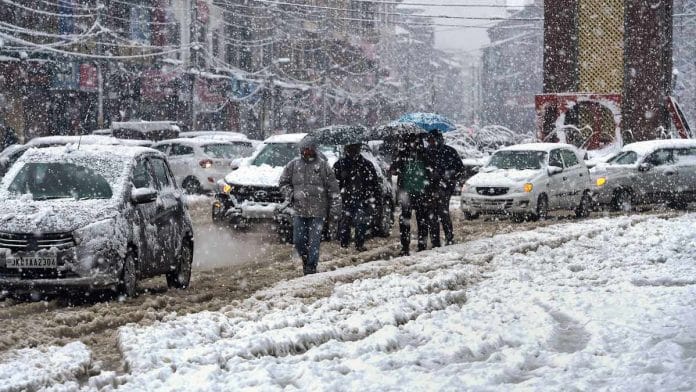Srinagar: Public transport is back on the Valley’s roads over 100 days after Jammu & Kashmir was stripped of its special status and divided into two union territories.
While the government is looking at the waning civil curfew as a positive development, within Kashmir, people are talking about “fatigue” among residents who realise they have to move on.
Article 370 and Article 35A, which gave J&K a degree of autonomy and some privileges, were emotive issues for Kashmiris, who saw them as a condition for the Valley’s accession to India.
When they were scrapped this August, the central government imposed a large-scale shutdown in the state to avoid law-and-order situations, restricting civilian movement, cutting landline and mobile connectivity, suspending the internet, and detaining political leaders (internet remains suspended in the Valley and political leaders are yet to be released).
The clampdown reportedly led miffed residents of Kashmir to start a “people’s curfew”, propagated by word-of-mouth, that kept public transport off the roads, students away from schools, and shops closed for the better part of the day.
While some militants reportedly issued posters directing that the curfew continue, the boycott was believed to be largely public-driven and continued long after the government eased restrictions on movement mid-September.
Unlike previous phases of unrest in the Valley — in 2008, 2009, 2010 and 2016 — no political entity made a call for shutdown.
According to the Kashmir Chamber of Commerce and Industry (KCCI), the Valley lost over Rs 10,000 crore in the three months from August to October, with the state’s famed apple trade hit severely as well.
Also read: Govt says J&K returning to normal, but doesn’t give details on release of political leaders
‘People have to buy essentials’
This week has been the first time since 5 August, when the government clampdown kicked in, that public transport was seen on the roads.
Shops and commercial establishments, which had only been operating for a couple of hours in the morning, have extended their operations well into afternoons.
“The shutdown by the people was spontaneous and so is the opening of shops and commercial establishments,” said KCCI president Sheikh Ashiq.
“Observing a shutdown for over three months is not a small thing and now fatigue is setting in. People realise that they will have to resume normal life at some point of time,” Ashiq added.
Mujeeb Ahmed, a bus driver operating on the airport-to-city route, also said the curfew was spontaneous, adding that the transport unions of Kashmir had not been directed by anyone to halt operations.
“There was a need to send a message that people are not happy with the abrogation of Article 370 and a shutdown was the need of the hour,” he said. “I believe people think that message has been sent. Also, harsh winter is here… people have to buy essentials, and they couldn’t have kept observing the shutdown,” Ahmed added.
Ghulam Qadir, a shoe-seller in Srinagar’s Batamaloo area, said “people have to live their lives”.
“I had so many customers coming in to buy shoes for the winter. I am sure there are long queues to buy other essential goods,” he added.
“And, to do so, public transport has to ply. The situation will return to normal in some time. This is how unrests are in Kashmir,” Qadir said. “They come in cycles. This years cycle seems to be over.”
‘Unpredictable Kashmir’
Winter or not, for the state administration, the heavy traffic on roads and open shutters is a good sign.
“We were expecting that people would react (after the scrapping of special status) and one of the possibilities was a shutdown,” said a senior government official.
“But three months of shutdown were not expected… The administration, however, was sure that it did not want to force people to resume normal lives… instead it wanted to provide a safe and peaceful environment that would prompt them to do so on their own,” the official added.
Amid the curfew, the administration — for the first time in the Valley’s history — was forced to publish newspaper ads asking people to end the self-imposed shutdown.
A flea market at Lal Chowk, which earlier operated only on Sundays, was allowed to function on weekdays given that shops elsewhere remained shut.
Vendors were also allowed to sell their products freely on the roads, all in a bid to bring the shopkeepers back.
Senior police officers, however, said they were keeping a strict vigil over how things move forward. “Not to be a pessimist but we need to ensure that peace prevails in the Valley,” said a senior police officer. “Kashmir has always been unpredictable.”
Also read: Abdullahs, Mufti & other detained Kashmiri leaders could be moved out to beat harsh winter







So long Pakistan behaves like a good neighbour and stops jehadi terrorists entering Jammu & kashmir state and dynastic political rulers understand and appreciate the central govt. initiative, life would be good for all.
Kashmir is probably in same state as Punjab in 1984 post Bluestar, massive security force presence, all political actors imprisoned, a virtual jail. There may be an election next year similar to 1985 in Punjab as well, if a BJP led govt comes to power in J&A it won’t even have the sham symbolism that Barnala govt back then had. Wait til next year to see if security situation will truly improve.
Kashmir people are also human beings only. They were angry about India’s abrogation on article 370. But they are more angry against their own kashmiri leaders who gave false promises on better life and also they are more angry against Pakistan where the situation in PHK is much worse than IHK. Kashmiris are in a state of palian syndrome and they will start appreciating what ever facilities they get back from India. Its a great win for Modi